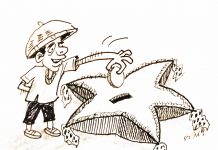
The year 2025 looms ahead like an unfinished painting—sketched outlines, but uncertain colors. From where we sit, the Philippines stands at a crossroads with old wounds and fresh dilemmas. My take? Unless we learn to balance short-term distractions with long-term resilience, we will be spinning our wheels in the mud as the world speeds ahead.
Let us consider our politics. It’s like watching a teleserye with too many plot twists: dynasties locking horns, opportunists switching alliances faster than you can say “balimbing,” and citizens left with nothing but popcorn and rising cynicism. Expect more of this soap opera in 2025, as new power players jockey for position ahead of the 2028 elections. But here comes my gripe: where are the leaders with vision, who don’t just throw cash at crises but build systems that outlast their term limits? We need less drama and more policy substance, but convincing politicians to think beyond their three years in office feels like teaching a cat to fetch—possible but rare.
Next, the economy. On paper, things might look promising: GDP projections, remittance numbers, foreign investment pledges. But try telling that to the Manong selling balut or the Ate sweating over her sewing machine. Inflation, especially for essentials like rice, feels like a cruel prank, and wages barely keep pace. The big challenge of 2025 will be ensuring that economic growth trickles down to the people. We are talking about decent jobs and affordable food, access to basic services that do not require standing in line for hours. But will the powers that be give these mundane realities the concentration they deserve? Or is it going to be more adrenalin in shiny infrastructure projects and celebrity ribbon-cutting?
Look at education—a sector that could either be our secret weapon or our Achilles’ heel. Post-pandemic, the learning gaps are glaring; let’s not sugarcoat it: many of our students cannot write even a coherent essay, let alone compete globally. The rollout of DepEd’s MATATAG curriculum reforms puts 2025 in stark relief as a do-or-die moment for our schools. Will these changes stick, or will they go the way of other good but poorly implemented initiatives? Personally, I’m rooting for the teachers, those overworked and underpaid heroes who keep the system afloat, but they need more than just encouragement; they need resources and respect.
On the climate front, the signs are not just ominous—they’re loud and wet. Every typhoon season reminds us that our readiness is still lacking, despite countless lessons from Yolanda, Ulysses, and Paeng. For all the talk of “resilience,” we cannot afford to continue treating the disasters as if they were just a test of Filipino grit. What’s needed is actual flood controls, smarter urban planning, and a national mindset where preparedness is valued over pity parties. It’s 2025, and we should have been done with the days when Bayanihan was the only defense against the wrath of Mother Nature.
We are at a culturally strange juncture. Social media keeps on reshaping how we view ourselves, more often than not in ways that feel out of touch with the real Philippines. We get so fixated on viral dances and outrage trends, but how often do we stop and reflect on what it really means to be Filipino in this fast-changing world? Is our identity something we wear only during Independence Day parades and fiestas? Or should it tell us how to handle life’s deeper questions: justice, fairness, and compassion? To my mind, 2025 will require a mass awakening, a return to reality, and away from the shallow curations on our screens.
Public health, meanwhile, feels like a neglected middle child. COVID might be yesterday’s monster, but its aftermath lingers in our overcrowded hospitals and strained healthcare workers. The Department of Health needs a clear vision for 2025—not just catchy slogans but real reforms in rural clinics, mental health services, and medical supply chains. Otherwise, we’ll keep seeing lives cut short not by rare diseases but by treatable conditions that fell through the cracks.
So, 2025 isn’t just another page in the calendar; it’s a litmus test for how much we’ve learned—or failed to learn—from the past. The problems are big, yes, but they’re not insurmountable. If anything, our perennial underdog status should inspire us to try harder, aim higher, and refuse to settle for mediocrity. After all, what’s the point of survival if we never truly thrive?



